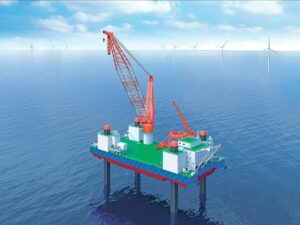14 April 2023 – ClassNK has issued an Approval in Principle (AiP) for the conversion plan of the medium-sized self-elevating platform (SEP) vessel for the installation of large wind turbine generator (WTG) on a semi-sub floater in port jointly developed by TOA Corporation (TOA), NIHON SHIPYARD CO.,LTD. (NSY), and Japan Marine United Corporation (JMU).

This project involves a semi-sub floater developed by JMU, and a large WTG to be installed by converted SEP vessel. As a solution to the current lack of port facilities for installing a large wind turbine on a foundation at ports in Japan, TOA, NSY and JMU have been jointly researching and developing a method to convert a medium-sized SEP vessel to be used as a jacked-up tall crane in a port. Such three-party’s joint R&D is based on the SEP vessel (equipped with a 1,250-ton crane) under the construction at JMU shipyard and to be co-owned by two companies including TOA corporation after her delivery. The converted SEP will enable the installation of large wind turbines even at ports without adequate facilities and is expected to promote the expansion of floating offshore wind power generation by providing a wider range of base port options.
ClassNK carried out a review of the jointly developed conversion plan in line with Part O of the Rules for the Survey and Construction of Steel Ships and issued the AiP on verifying conformity to the prescribed requirements.
ClassNK will continue to support advanced initiatives aimed at the broader adoption of offshore wind power generation as the certification body and contribute to the decarbonization of society.
* Part of the R&D project “Technology development and construction technology development for semi-submersible units with hybrid mooring system” jointly developed by TOA corporation, NSY, JMU, and “K”Line Wind Service, LTD.as a Green Innovation Fund project under Japan’s New Energy and Industrial Technology Development Organization (NEDO).
Approval in Principle (AiP):
At the initial stage of designing or before the specific target ship to be implemented is decided, the design is examined based on the existing regulations such as international conventions and ship classification rules, and an AiP is issued as proof of conformity with requirements. It also prevents rework of regulatory aspects in the post-process, shortens the examination time at the time of class registration, and can be used as a technical basis for an external appeal of the design status.
